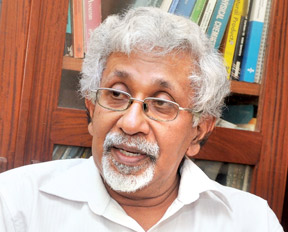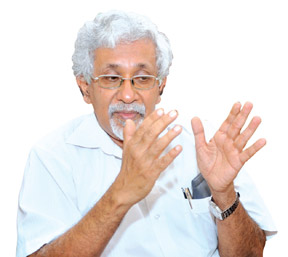|

Tuned to a different chemistry
Ruwanthi ABEYAKOON
A professor in science and a conductor / clarinettist in an
orchestra. How can one achieve top level in two entirely different
fields? Is it the same chemistry that works for both science and music?
“I had a deep and a passionate interest in Science. It is an important
part in my life. Music and science, both were aspects which needed
fulfilment in my life. Neither did I do on a competitive basis. I have
not really strived to do anything. It is just doing what you like to
do,” President, the Players Committee, SOSL, Professor Ajith Abeysekera
says on Encounter of the Week.
 There is no opportunity for the younger
generation to listen to classical music. Those days there was a lot of
good music played on the radio. We mainly follow three music types-
Northern Indian, Karnatic and Western. Today children never get to hear
good music. Even with the advancement of electronic media, it is only
pop and popular music that they get to hear. It is all about the song,
dance and the act. It is bad to restrict them to one thing. Music is now
driven by money There is no opportunity for the younger
generation to listen to classical music. Those days there was a lot of
good music played on the radio. We mainly follow three music types-
Northern Indian, Karnatic and Western. Today children never get to hear
good music. Even with the advancement of electronic media, it is only
pop and popular music that they get to hear. It is all about the song,
dance and the act. It is bad to restrict them to one thing. Music is now
driven by money |
Q: How did your path in the music field begin to unfold and
how do you see yourself today?
A: I started music because of my mother who was a pianist.
From the time I can remember I heard classical music at home. I was
learning music and the piano before I started playing the clarinet when
I was twelve. There was something in me driving towards the orchestra.
Just before I got into the university in 1969 I joined the Symphony
Orchestra of Sri Lanka (SOSL) as a clarinettist and have been playing
ever since.
Conducting the orchestra was more or less an accident. I am
enormously indebted to Professor Earle de Fonseka who was the principle
conductor of the orchestra for the longest period of time. Mostly I see
myself as a clarinettist and I enjoy making music with my friends. I
have also been involved in the administration and am the President of
the Players Committee.
Q: Can you reminisce the evolution of the Symphony Orchestra
of Sri Lanka?
A: The orchestra started off in 1930s with three Danish
brothers named Wagn living in Sri Lanka started an orchestra. In 1958
Symphony Orchestra of Ceylon was steered by the Arts Council which was
an government institution. When the country became a republic the
orchestra retained its logo SOC and changed its name to Symphony
Orchestra of Colombo. We always had the blessing of the government. In
1994 it became the Symphony Orchestra of Sri Lanka. Thus as a tradition
all our concerts other than special ones start with playing of the
National Anthem.
The orchestra is not concerned about making money but we are trying
to play professional. The orchestra covers the whole range of people
which includes students who are in their teens as well as professionals.
We are very lucky to have exceptional performers and people who have
reached the top level like Ananda Dabare and Dushyanthi Perera. It is
their commitment towards classical music that have brought the orchestra
thus far. They do not play just for entertainment but they retain the
standard of the orchestra. It is their love for the music and their
desire to share the experience with others, that keep them involved in
the orchestra.
Q: The involvement of children in outskirts of Colombo in the
orchestra is less. What is SOSL doing to reach the talented in those
areas?
A: SOSL embarked on a special project called ‘SOSL Outreach
Programme’ last year. Through the Outreach programme we give away fifty
free tickets to school students and university students. That is to take
the orchestra out of Colombo. We have been conducting programmes
consistently over the last few years in outstation areas. We recently
went to Killinochchi. We have been to Galle and we are planning to go to
Jaffna this year. We also bring in students from outstation in order to
expose them to orchestral music. There is so much talent in the country.
I believe it is a crime not to give them the opportunity to hear
classical music.
 |
|
Professor Ajith Abeysekara. Picture by
Wasitha Patabandige |
We also encourage Sri Lankan composers and we play suitable pieces of
music in the orchestra . To give the opportunity to young classical
musicians, every year young soloist concert is also held.
Q: How did the children in the other districts respond to
classical music which is rather alien to them?
A: We basically talk about how music is made and about the
instruments when we do the Outreach Programmes. In Killinochchi we
played a Tamil song and the response was amazing. We had people there
who had been waiting for about two hours for our arrival. It was very
satisfying. We also bring in children from outstations. For our last
concert we brought children from North and East with the support of Sri
Lanka Army and charity organisations.
Taking the Outreach Programme to Galle was different. Galle was not
totally illiterate. There is a fair bit of activity going there because
of the National Youth Orchestra. So there we played a bit of
sophisticated music.
Q: The interest of youngsters in classical music is gradually
fading away. What do you think are the reasons for this decline?
A: There is no opportunity for the younger generation to
listen to classical music. Those days there was a lot of good music
played on the radio. We mainly follow three music types- Northern
Indian, Karnatic and Western. Today children never get to hear good
music. Even with the advancement of electronic media, it is only pop and
popular music that they get to hear. It is all about the song, dance and
the act. It is bad to restrict them to one thing. Music is now driven by
money. So it is challenging to cultivate classical music in the young
ones. I think media plays a huge role in enlarging the audience of
classical music. Electronic media should be doing a great deal in this.
What we see from the West is the popular culture entering our society.
It is unfortunate because by the time they become adults their minds are
formed. For those who grew up with music in the house it is much easier
for them to get involved in classical music. It is a fast moving world.
So the millennium generation has to be ready to spend time. If I do not
practice I can not play. They have to be prepared to commit themselves.
We have very good young players who go abroad and only a certain number
will comeback. We have lost a lot of talent due to this. Now that the
conflict is over I hope things will change in the future.
Q: Classical music is generally conservative. How do you think
you can work to enlarge the musical experience of our audience?
A: When you go for a musical show, you will want to know the
singers who will be coming before knowing the songs they will sing. But
in the orchestral concerts first they ask what are the pieces that will
be played. If it is entirely new people wont come. So you have to strike
a fine balance here. When we make the programme we include very familiar
pieces along with the not so popular ones. We also do light concerts
such as the Christmas Concert at which we play music for the family. We
also do concerts for the premier customers of the HSBC Bank.
Q: Apart from the orchestral concerts of the SOSL what other
things are done to keep classical music alive?
A: We also do a lot of chamber music. Chamber music developed
our love for classical music. In an orchestra the player is submerged.
He is submerged to the conductor and it is a collective performance. But
in chamber music our personal expression is there. We are trying to keep
chamber music alive. It gives a lot of satisfaction to the players. The
deepest thoughts of the composer is found in chamber music.
Now we are providing the opportunity for the public to experience
chamber music which will make them love classical music. The main
problem in promoting chamber music is the funding. In any other country
very rich people leave their money behind to what they believe in and
for cultural things. In Sri Lanka very few do that. We hardly find
corporate sponsors in promoting chamber music. Fortunately at present we
have Professor Earl de Fonseka Trust to promote chamber music.
Q:There are many renowned choirs in Sri Lanka. Does the SOSL
collaborate with them for concerts?
A: Almost all the choirs do popular music. They cannot project
over an orchestra. They sing a different kind of music that need
microphones. For our Christmas concert we work with choirs. Our biggest
choral was in 2009 when we presented Verdi Requiem with the best choirs
in Colombo. The orchestra was over 80 and an audience of more than 2500
people gathered to witness this event.
|



